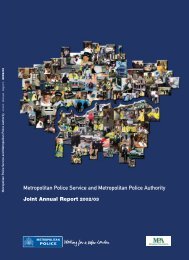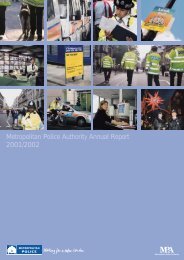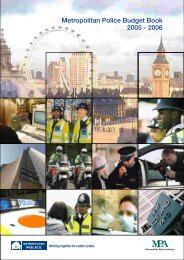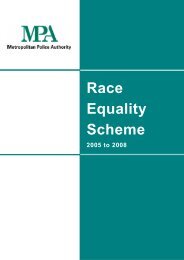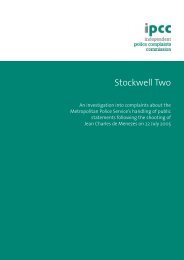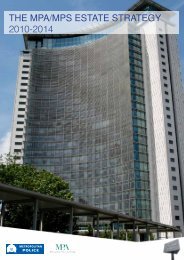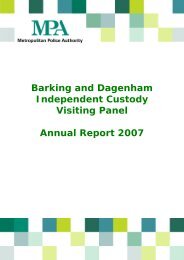Final Report of the Morris Inquiry: The Case for Change
Final Report of the Morris Inquiry: The Case for Change
Final Report of the Morris Inquiry: The Case for Change
You also want an ePaper? Increase the reach of your titles
YUMPU automatically turns print PDFs into web optimized ePapers that Google loves.
PATHWAY TO CHANGE<br />
example <strong>of</strong> this. In fact <strong>the</strong> probationers concerned resigned from <strong>the</strong> service<br />
soon after <strong>the</strong> programme was broadcast. However, in order to dismiss <strong>the</strong>m,<br />
<strong>the</strong> service would have had to invoke <strong>the</strong> Regulations resulting in delay, etc. despite<br />
<strong>the</strong> strong video evidence against <strong>the</strong>m. This is because, as sworn <strong>of</strong>ficers, <strong>the</strong>y<br />
were entitled to <strong>the</strong> same protection as <strong>of</strong>ficers who have completed <strong>the</strong>ir<br />
probationary service.<br />
2.72 Ano<strong>the</strong>r concern is <strong>the</strong> use <strong>of</strong> ‘abuse <strong>of</strong> process’ arguments (which we accept<br />
an accused <strong>of</strong>ficer is entitled to raise) to frustrate <strong>the</strong> proceedings. It is not unusual<br />
<strong>for</strong> <strong>the</strong> first day <strong>of</strong> a disciplinary hearing or even longer to be dominated by legal<br />
arguments <strong>of</strong> this kind.<br />
“… legal issues such as ‘abuse <strong>of</strong> process’ etc. are <strong>of</strong>ten raised. This does tend to cause<br />
bureaucratic delay in <strong>the</strong> process.” (Submission from DAC Stephen Roberts, MPS.)<br />
“Sometimes those abuse <strong>of</strong> process arguments go on <strong>for</strong> three weeks.”<br />
(Evidence <strong>of</strong> Commander Phillip Hagon, MPS.)<br />
“We have been taking some cases to <strong>the</strong> courts, and winning <strong>the</strong>m on abuse <strong>of</strong> process. Now<br />
that is in nobody’s interest, <strong>for</strong> us to win a case on abuse <strong>of</strong> process, because at <strong>the</strong> end <strong>of</strong> <strong>the</strong><br />
day, <strong>the</strong> question is not answered, ei<strong>the</strong>r <strong>for</strong> <strong>the</strong> complainant or <strong>for</strong> <strong>the</strong> <strong>of</strong>ficer.”<br />
(Evidence <strong>of</strong> Clint Elliott, General Secretary, Police Federation.)<br />
2.73 Given <strong>the</strong> characteristics <strong>of</strong> <strong>the</strong> system which we have outlined above, it is<br />
hardly surprising “that misconduct proceedings regularly relate to events that happened<br />
many years be<strong>for</strong>e and, in <strong>the</strong> more complex <strong>of</strong> cases, that <strong>the</strong> whole process is routinely<br />
measured in terms <strong>of</strong> years ra<strong>the</strong>r than months, with a corresponding cost to <strong>the</strong> public purse<br />
that can be difficult to reconcile in <strong>the</strong> public opinion with a process that ostensibly is <strong>the</strong>re to<br />
determine whe<strong>the</strong>r an individual should retain <strong>the</strong>ir current employment or not.”<br />
(Submission from <strong>the</strong> MBPA.)<br />
2.74 <strong>The</strong> creation <strong>of</strong> <strong>the</strong> IPCC will undoubtedly bring some improvements to<br />
<strong>the</strong> system but it is faced with implementing a system which <strong>the</strong> Commission<br />
itself considers is “not working”. We will outline our recommendations <strong>for</strong> change<br />
in <strong>the</strong> next chapter <strong>of</strong> this report but, given <strong>the</strong> weight <strong>of</strong> evidence we have<br />
received, we, like <strong>the</strong> MBPA, “… find it hard to believe that anyone could seriously argue<br />
that such a system, even through what we hope will be <strong>the</strong> corrective filter <strong>of</strong> IPCC,<br />
represents <strong>the</strong> best and most efficient system available <strong>for</strong> resolving public and internal<br />
complaints against police <strong>of</strong>ficers.”<br />
<strong>The</strong> employment status <strong>of</strong> police staff<br />
2.75 In contrast to <strong>the</strong> complex regulations governing police <strong>of</strong>ficers, police staff<br />
are dealt with in a more straight<strong>for</strong>ward and recognisable way.<br />
43


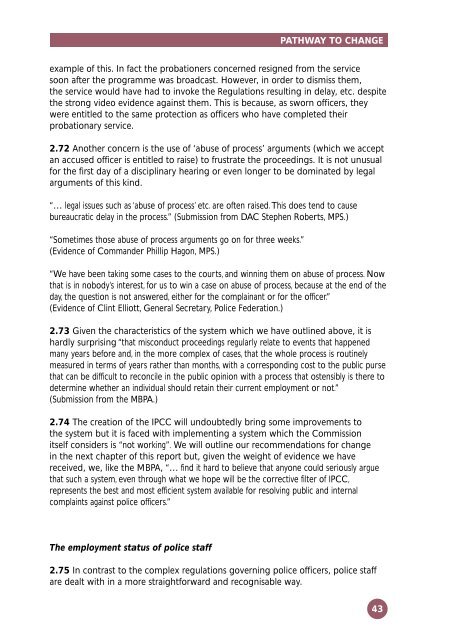
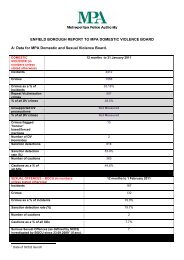
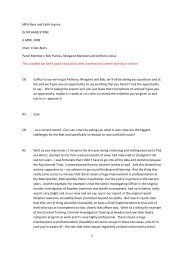
![Appendix 1 [PDF]](https://img.yumpu.com/51078997/1/184x260/appendix-1-pdf.jpg?quality=85)

![Transcript of this meeting [PDF]](https://img.yumpu.com/50087310/1/184x260/transcript-of-this-meeting-pdf.jpg?quality=85)
![Street drinking in Hounslow [PDF]](https://img.yumpu.com/49411456/1/184x260/street-drinking-in-hounslow-pdf.jpg?quality=85)

